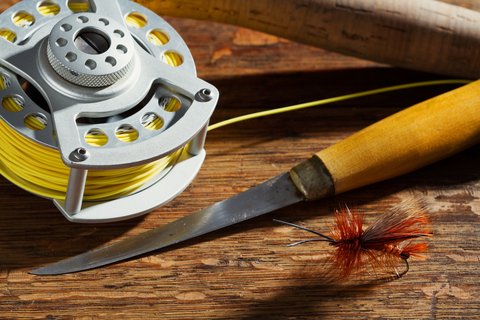In comparison to other types of fishing reels, selecting a fly reel might not seem very important. After all, it does little more than hold line. Right?
It is true that the primary purpose of a fly reel is to hold line and you may use it for months without having to fight a fish with it. However, when the time does come to hook a monster and you need to use that reel to land a fish, the last thing you want is a cheap, undependable reel.
When selecting a fly reel, you want to pick one that is quality. You want a reel that will stand up to harsh conditions and be dependable, but this does not mean you need to spend $300 or more on a reel. Some very good fly reels are available for less than $100.
While many of the big-name manufacturers of fly reels offer models for $200+, they often have entry-level reels, for far less money, which will meet all of your needs, whether you are a beginner or a 40-year fly-fishing veteran.
If you go with a name-brand fly reel, you can trust that the reel will be of solid construction and will operate properly for many years.
Here are the most important factors you should keep in mind when purchasing a fly reel:
Drag
The drag can make the difference between landing a big fish and losing it. Most fly reels come with one of two types of drag systems. The first type is the basic click and pawl drag system, which is best suited to smaller fish, because it does not offer much in the way of adjustability or stopping ability. This is not to say that you cannot land big fish with this type of drag, but it can make it more challenging. A better choice for larger fish is the disc drag system. It is easier to adjust and is much smoother than the click and pawl system. It also has considerably more stopping power.
Size
It is important to buy a reel that is the right size for the line you are using. Make sure it can hold the amount of line and backing you need it to hold. Typically, fly reels are designed to hold a range of line weights. If you will be fishing 5-weight line; then purchase a reel that is designed for 5-weight line.
Weight
The weight of a fly reel depends heavily on how it is constructed. Most fly reels are either made from pre-cast metal or machined metal. The latter tend to be lighter, but more expensive. There is no right or wrong answer when choosing between the two types of reel construction, but in general, the machined metal reels tend to be more durable in the long run. The important thing, however, is finding a reel that fits into your budget, which feels balanced and not too heavy when you are using it.
Whatever type of fly reel you choose, nothing is more important than keeping it well maintained, so it is operating at peak performance. A quality, well-maintained fly reel is likely to last you for many years and help you land any size fish you encounter.








